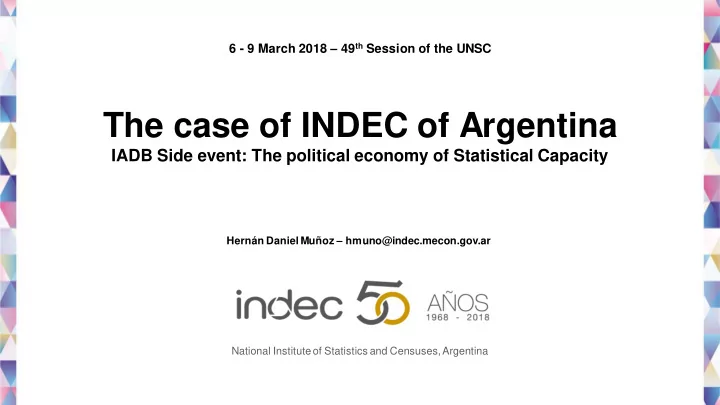

6 - 9 March 2018 – 49 th Session of the UNSC The case of INDEC of Argentina IADB Side event: The political economy of Statistical Capacity Hernán Daniel Muñoz – hmuno@indec.mecon.gov.ar National Institute of Statistics and Censuses, Argentina
Introduction INDEC was established by a 1968 Law (Head of the NSS) Until 2007: High professionalism, technical accuracy, active international participation Deep institutional crisis (2007-2015). Political Interference PO 55/2016. Declaration of Statistical Administrative Emergency until December 2016 Several challenges were found, mainly grouped into three categories: 1- Reliability of indicators 2- Loss of leadership over National Statistical System (NSS) 3- Institutional weakness Quick recovery Sept 2016: Official statistical service was completely re-established Nov 2016: IMF removed the Declaration of Censure Dec 2016: End of statistical emergency 2
Milestones on statistical capacity building 1968. INDEC was established by Law 17.622 1983. Return of democracy. New strengthening of the NSS 1990. Openness. Development of technical capacity and dissemination 2006. Political interference. Lower statistical capacities 2015. Recovery and development. Institutional transformation 3
Path of development towards 2020 Five strategic pillars: International reinsertion Strengthening of statistical infrastructure Leadership of the NSS Improvement of dissemination policies Institutional transformation 4
International reinsertion Restoration of the publication of indices New framework of Social and relations with the International Reliability international community Institutional Transformation Cooperation Accession to Programs within Bilateral IADB with IMF OECD UN System Cooperation Strengthen Economic Statistics Increase the Scope of Social Statistics Integrated System of social, economic and environmental information, oriented towards demand, with intensive use of the new ICTs and according to international norms 5
INDEC ´ s transformation - Factors of political economy a) Role of policy-makers and individuals actors (advocates) i) President ii) New management iii) Recovered technical staff b) International reinsertion (i.e. OECD) c) Argentina ´ s New Administration based on: i) Transparency ii) Evidence based public policy d) Role of the crisis / Public awareness and support 6
Final lessons from the Argentine case The more institutionally solid an NSO is, the less the chances of political interference Fundamental principles , values and codes of good practice should be disseminated Critical importance of the international statistical community Awareness of institutional reality to preserve the functions of the NSO 7
Thank you National Institute of Statistics and Censuses, Argentina
Recommend
More recommend